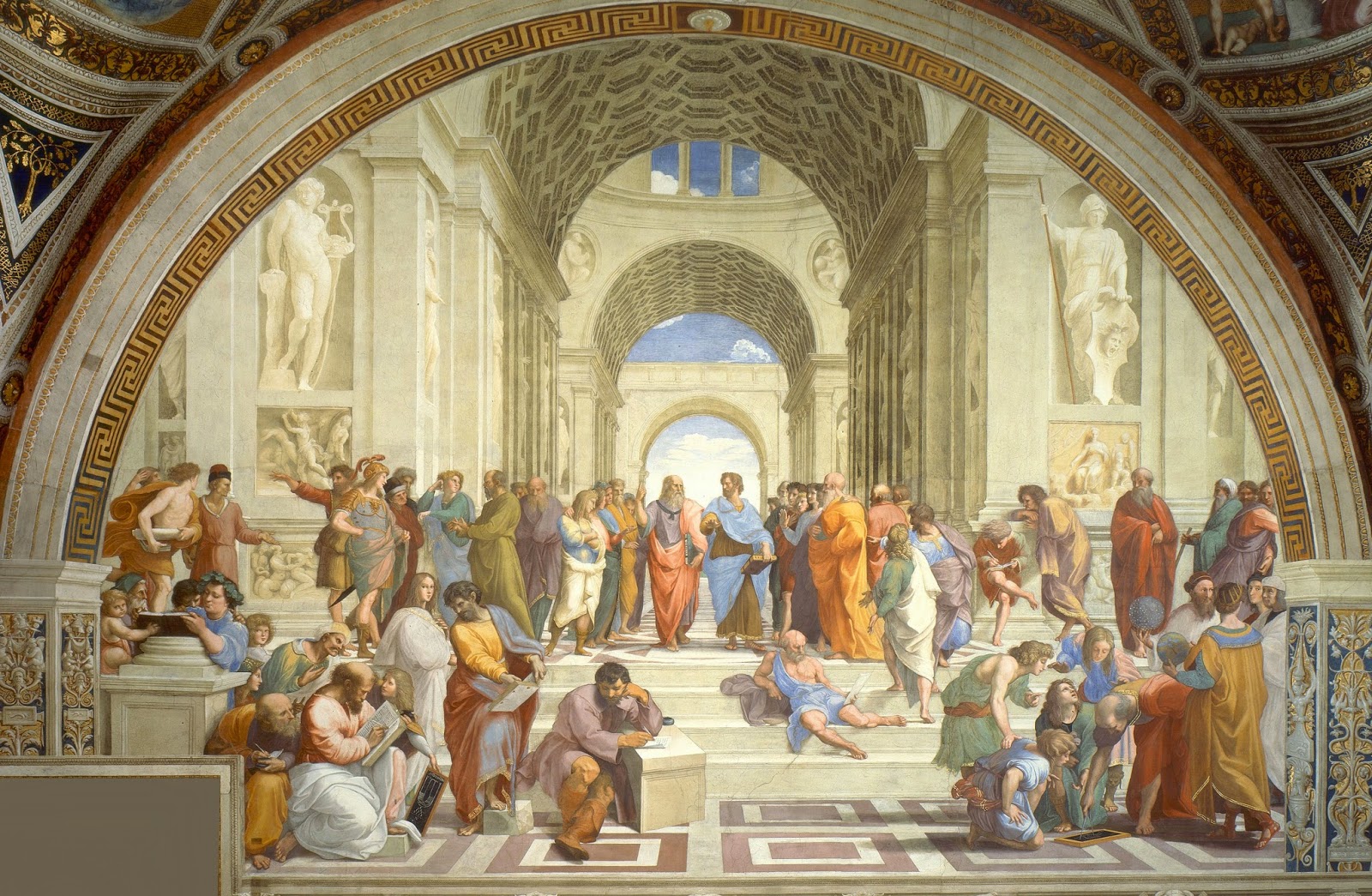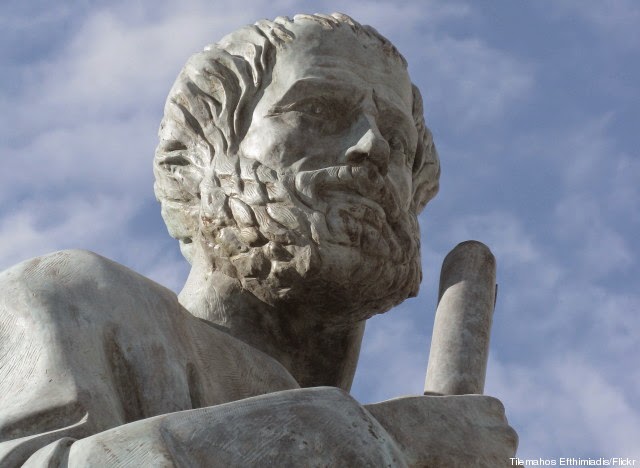
Every logical person would advise us to use some analytical directions to reach happiness or else we could get lost. But how could we satisfy this common need, this common search for happiness?
Greek philosophers gave many answers to that question. Terms such as knowledge and self-awareness, self-improvement, moral virtue, kindness, harmony, freedom, and self-control are some of the "tools" Greek philosophers suggested as ideal for happiness. Such philosophers are Epictetus, Epicurus, and Aristotle: use their "map" on your way to happiness.
Survival Guide, by Epictetus

Epictetus (A.D. c. 55 – 135) could be the "father" of a specific phrase: "God, grant me the serenity to accept the things I cannot change, the courage to change the things I can, and the wisdom to know the difference.".
Practise then from the start to say to every harsh impression, "You are an impression, and not at all the thing you appear to be." Then examine it and test it by these rules you have, and firstly, and chiefly, by this: whether the impression has to do with the things that are up to us, or those that are not; and if it has to do with the things that are not up to us, be ready to reply, "It is nothing to me."
Philosophy, Epictetus taught, is a way of life and not just a theoretical discipline. To Epictetus, all external events are determined by fate, and are thus beyond our control; we should accept whatever happens calmly and dispassionately. However, individuals are responsible for their own actions, which they can examine and control through rigorous self-discipline.
"Consider yourself as a slave or as a free being, it depends only on you."
The Garden, by Epicurus

Epicurus (341–270 BC) was an ancient Greek philosopher as well as the founder of the school of philosophy called Epicureanism. Only a few fragments and letters of Epicurus's 300 written works remain. Much of what is known about Epicurean philosophy derives from later followers and commentators.
It is impossible to live a pleasant life without living wisely and well and justly,
and it is impossible to live wisely and well and justly without living a pleasant life.
Natural justice is a symbol or expression of usefulness, to prevent one person from harming or being harmed by another.
For Epicurus, the purpose of philosophy was to attain the happy, tranquil life, characterized by ataraxia—peace and freedom from fear—and aponia—the absence of pain—and by living a self-sufficient life surrounded by friends. He taught that pleasure and pain are the measures of what is good and evil; death is the end of both body and soul and should therefore not be feared; the gods neither reward nor punish humans; the universe is infinite and eternal; and events in the world are ultimately based on the motions and interactions of atoms moving in empty space.
An inscription on the gate to The Garden is recorded by Seneca in epistle XXI of Epistulae morales ad Lucilium: "Stranger, here you will do well to tarry; here our highest good is pleasure"
Eudaimonia in Aristotelian ethics

Since happiness is an activity of the soul in accordance with perfect virtue, we must consider the nature of virtue; for perhaps, we shall, thus, see better the nature of happiness.
Aristotle (384–322 BCE) was a Greek philosopher and scientist born in the Macedonian city of Stagirus, in 384 BCE. He believed all peoples' concepts and all of their knowledge was ultimately based on perception. Aristotle's views on natural sciences represent the groundwork underlying many of his works.
His ethics, though always influential, gained renewed interest with the modern advent of virtue ethics. All aspects of Aristotle's philosophy continue to be the object of active academic study today.
Aristotle considered ethics to be a practical rather than theoretical study, i.e., one aimed at becoming good and doing good rather than knowing for its own sake. He wrote several treatises on ethics, including most notably, the Nicomachean Ethics.
Aristotle taught that virtue has to do with the proper function (ergon) of a thing. An eye is only a good eye in so much as it can see, because the proper function of an eye is sight. Aristotle reasoned that humans must have a function specific to humans, and that this function must be an activity of the psuchē (normally translated as soul) in accordance with reason (logos). Aristotle identified such an optimum activity of the soul as the aim of all human deliberate action, eudaimonia, generally translated as "happiness" or sometimes "well being". To have the potential of ever being happy in this way necessarily requires a good character (ēthikē aretē), often translated as moral (or ethical) virtue (or excellence).
References: Huffington Post Gr, Wikipedia
Related:
- 21 Habits of Happy People
- 11 Ways to Live a Happier Life, According to a Psychologist (Hint: These have nothing to do with money!)
- Socrates: The Test Of Three
- MOTIVATION: 15 Best Socrates Picture Quotes
- This Animation Will Explain To You Plato's Philosophy In Almost 3 Minutes
- The 10 Most Famous Personalities Of The Last 6,000 Years
- 8 Great Philosophical Questions That We’ll Never Solve
- One Buddha Teaching That Will Tell You More About Yourself Than Anything Else
- 25 Life Changing Lessons to Learn from Buddha
- 18 Rules Of Living By The Dalai Lama
- 25 Life Lessons from Albert Einstein
- Albert Einstein - How I See the World
- This Explains Why Einstein's Brain Was Special
- Gandhi’s 10 Fundamentals: How To Change The World
- Mark Twain’s Top 9 Tips For Living A Kick-Ass Life
- The Wisdom of Bruce Lee: 25 Quotes on Mastery, Martial Arts & Consciousness
- The 10 Inventions of Nikola Tesla That Changed The World
- 10 Unbelievable Facts You Didn't Know About Nikola Tesla
- Leonardo Da Vinci’s 6 Ingenious Inventions
- Train Your Brain To Let Go Of Habits – 10 Methods For Creating New Neural Pathways
- It will take just 1 minute to read this and change your thinking.
- 99 Interesting Quotes That Will Change How You See The World
- “Where there is love there is life!” -Mahatma Gandhi
- John Lennon's "Imagine", made into a beautiful comic.














Thanks a lot for sharing such wise thoughts. Have a peek at the page.
ReplyDeleteI cannot contribute anything more. Your content is too great.* gmail sign up
ReplyDeleteGreat Information sharing .. I am very happy to read this article .. thanks for giving us go through info Fantastic nice. I appreciate this post
ReplyDeletegmail account login
Your posts are amazing, thank you for always sharing.
ReplyDelete9 YouTube Mistakes
The old Greek already knew the secret to happiness and happy life. One of the key is letting go of things that are no longer serving you. These letting go affirmations will help achieve that.
ReplyDelete